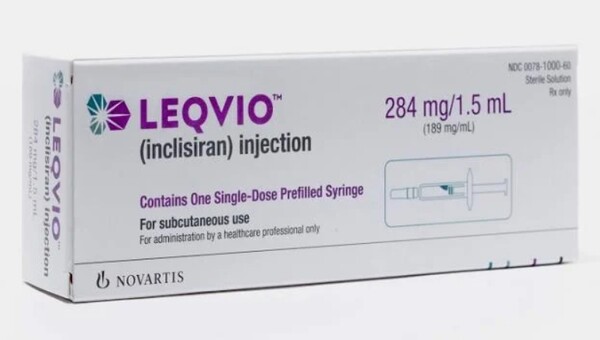Leqvio (inclisiran), a cholesterol management drug that requires only two subcutaneous injections per year, is preparing to land in Korea.
The Ministry of Food and Drug Safety (MFDS) is reportedly reviewing Novartis Korea's application to license Leqvio. Approval is expected as early as the first half of the year.

Leqvio is a small interfering ribonucleic acid (siRNA) therapy that inhibits PCSK9 synthesis and is a subcutaneous injection administered once every three months after the initial dose and once every six months after that. Administered twice a year by a healthcare provider, Leqvio could help improve adherence to treatment for cholesterol management.
Novartis acquired the rights to develop, manufacture, and commercialize Leqvio from Alnylam Pharmaceuticals, a leader in RNAi therapeutics. The drug is available in more than 80 countries worldwide, including the United States, European Union, and China.
Cardiovascular disease is the number one cause of death worldwide, accounting for one in three deaths. However, 80 percent of all cardiovascular events are preventable, making preventive management of cardiovascular disease a global health challenge.
Low-density lipoprotein cholesterol (LDL-C) is one of the most prominent risk factors for cardiovascular disease and a readily manageable therapeutic target. Statin therapy is currently the most widely used treatment for LDL-C management, but many patients fail to reach recommended LDL-C targets with statin therapy alone.
Patients who do not achieve LDL-C control with a maximum tolerated dose of statins are recommended to use combination therapy with the oral drug ezetimibe and, if that fails, with injectable drugs, such as Repatha (evolocumab) and Praluent (alirocumab).
Repatha and Praluent are monoclonal antibody therapies with a PCSK-9 inhibitory mechanism and are subcutaneous injections administered every two weeks or once a month. In Korea, they are used for treating patients with heterozygous and homozygous familial hypercholesterolemia (HeFH and HoFH) and as combination therapy with other lipid-lowering drugs in patients with atherosclerotic cardiovascular diseases such as myocardial infarction and stroke.
Accordingly, Leqvio is expected to compete with Repatha and Praluent after its domestic launch.
Due to its PCSK-9 inhibition mechanism, Leqvio has similar LDL-C-lowering effects to these monoclonal antibody therapies. In general, while Repatha and Praluent reduce LDL-C by about 60 percent, Leqvio is thought to reduce LDL-C by about 50 percent.
Some claim Leqvio's unique mechanism of targeted uptake by liver cells may make it an effective option for patients with statin-related side effects.
Leqvio's greatest strength is that it is administered only twice yearly, significantly less often than existing monoclonal antibody therapies. Industry insiders said this is advantageous because it allows patients to manage their LDL-C without the traditional restrictions, such as fewer doctor visits and freedom to travel for extended periods of time, at least for ultra-high-risk patients who need to visit the doctor monthly.
However, it also has limitations due to its late development and lack of long-term safety data, especially cardiovascular outcomes trial (CVOT) data, compared to existing monoclonal antibody therapies.
There is also the question of how it will be priced after launch. While the number of treatments will be much lower, patients may have to pay more per treatment, they noted.
Novartis Korea has been working with local governments and academic societies to establish a dyslipidemia prevention and management system before the approval of Leqvio in Korea.
For instance, the company signed a business agreement with the Seoul Metropolitan Government and the Korean Society of Interventional Cardiology late last year and has been conducting various collaborative activities, including vascular healthcare education to prevent dyslipidemia and publicity campaigns to raise awareness of the disease, early detection of dyslipidemia patients in conjunction with the cardiovascular disease and metabolic syndrome project, and the treatment of patients at high risk of dyslipidemia and comprehensive healthcare and ongoing management.

